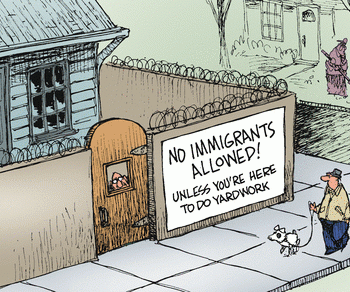How will Biden’s performance on immigration influence Latino and immigrant voters? Should Americans expect a Obama-esque DACA move from Biden as he tries to court the Democratic Party’s progressive, pro-immigration voting blocs?
By Marcela Garcia | The Boston Globe | APR. 24, 2023 | Photo by Doug Mills
Under increasing pressure from pro-immigration advocates, President Barack Obama enacted an unprecedented policy in June 2012 that probably played a significant role in his reelection. Deferred Action for Childhood Arrivals, known as DACA, dramatically changed the lives of hundreds of thousands of undocumented immigrants who were brought by their parents to the United States as children. Obama handily won more than 70 percent of the vote among Latinos and Asian Americans over Republican presidential candidate Mitt Romney.
Nearly 11 years later, President Biden finds himself in a similar tight spot. As Biden gets ready to formally announce his reelection run, it’s worth taking stock of his record on immigration policies. How will Biden’s performance on immigration influence Latino and immigrant voters? Should Americans expect an Obama-esque DACA move from Biden as he tries to court the Democratic Party’s progressive, pro-immigration voting blocs?
For Vanessa Cárdenas, executive director of America’s Voice, an immigrant advocacy group, “what we have seen” from Biden lately has “been really, really disappointing.” Biden came to the White House after campaigning on “one of the most, if not the most, progressive immigration” platforms that we have seen, Cárdenas said. She told me in an interview back then that she and many other immigration advocates felt it was a thrilling time. “I think he wants to be a transformational president when it comes to this issue because he cares about his legacy,” Cárdenas told me.
But it has been quite frustrating that Biden has reneged on his promise to restore asylum at the border, Cárdenas said Monday. “Biden was such a defender of asylum and so eloquently spoke about why [Trump’s former anti-asylum policies] were against our values and who we are.”
Two years and change into his presidency, Biden has not been transformational on immigration. For one, it appears that “who we are” is a nation that balks at international asylum obligations, with some Senate Democrats claiming some of Biden’s current policies — ongoing restrictions at the border to limit arrivals in light of a surge in migrant flows to the United States — violate US law.
“As an advocate who has worked on these issues for a couple of decades, I really wanted more,” said Jennie Murray, president and CEO of the National Immigration Forum, another immigrant advocacy nonprofit. “It’s half good and half concerning.” Murray pointed to family detention, and a focus on deterrence and enforcement at the border, as part of the concerns. “It was shocking because [those policies] have never been successful,” she said.
It seems as if Biden has used a “two steps forward, one step back” type of approach to immigration policy. In terms of successes, both Cárdenas and Murray pointed to the massive expansion of humanitarian parole programs to help Afghan evacuees, Ukrainians, and, most recently, Cubans, Haitians, Nicaraguans, and Venezuelans. According to the New York Times, as of mid-April, roughly 300,000 Ukrainians had come to the United States and, by the end of 2023, some 360,000 Cubans, Haitians, Nicaraguans, and Venezuelans are expected to be authorized to move here in what the Times called a “new back door on immigration” that Biden opened.
Indeed, this administration has led an impressive scaling up of humanitarian parole, an underrated discretional tool of the federal government. On one level, it’s a testament to our government’s capacity to be creative. On another, according to Cárdenas, it’s consistent with research that shows Americans’ support for a compassionate immigration system. “Americans are stepping up and saying, ‘yes, we want to sponsor folks; yes, we want to help people; yes, we want to help them integrate.’” And that’s reflected in surveys, said Murray. “Last month, 79 percent of Evangelicals said they want humane and orderly opportunities for folks that are fleeing violence and other factors,” she said.
Biden will reportedly name Julie Chávez Rodríguez, a granddaughter of the late labor leader Cesar Chavez, as his campaign manager, which is regarded by Latino and immigrant advocates as a great move. Will Biden try a Hail Mary like Obama did in 2012? The political landscape probably won’t allow it. “We were divided then, but this is divided,” Murray said, referring to current polarization levels. If Biden does something, it would be something pragmatic, not sweeping, such as expanding TPS, the temporary protected status extended to certain nationals of countries in distress, Cárdenas said.
If Biden moves forward with a plan or executive order, it may help his 2024 reelection bid, but it will be greeted by the Republican reflex reaction of fear and loathing. That’s what makes common-sense immigration reform so difficult: In a country of immigrants, newcomers are treated like political pawns.







